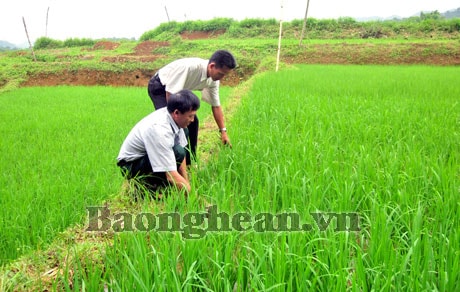Tri Le - Que Phong: Struggling to find a way out of poverty
According to information from Tri Le Commune Police, recently in some Mong villages in this border commune, people continue to illegally migrate to Laos. In addition, the phenomenon of replanting opium poppies in the area that appeared at the beginning of the year has not shown any signs of abating.
(Baonghean)According to information from Tri Le Commune Police, recently in some Mong villages in this border commune, people continue to illegally migrate to Laos. In addition, the phenomenon of replanting opium poppies in the area that appeared at the beginning of the year has not shown any signs of abating.
Hunger is believed to be the cause of the resurgence of illegal immigration in the border commune of Tri Le. Many Mong households are chronically hungry, because these areas can only grow one crop, and the upland rice crop often fails.
Many economic models have been applied in Mong villages, but they have not been effective. Raising black pigs is difficult in terms of product consumption, and the black chicken breed (brought from other localities) is not suitable for the climate and soil, so the chickens die in large numbers. Mr. Dam Thien Thuong - Deputy Head of the National Steering Committee for New Rural Development in Tri Le commune, said: Actually, in the locality, people have been raising black chickens for a long time. This breed of chicken is suitable for the climate in the area. The commune wants to build an incubator to develop the breeding stock, but "cannot", because the commune does not have national grid electricity.
Two-crop rice cultivation is a sustainable solution to hunger eradication for the Mong people in Tri Le.
A feasible measure to prevent hunger, thereby preventing illegal migration to the Tri Le highlands, is to grow two rice crops in these villages. According to the assessment of a recent workshop, the JO1 and JO2 rice varieties are very suitable for this policy. The two rice varieties can withstand the cold climate of the highlands, have a short growing period (115 days), and through a two-crop pilot in Muong Long village, the yield was 60-65 quintals/ha. The plan to bring two crops to the Mong people's area would be: one crop of short-term hybrid rice, the other crop of cold weather, JO1 or JO2 rice with cold resistance.
A crop that is bringing hope to the people to escape poverty is passion fruit, which will be expanded in area. According to the plan, Tri Le commune will develop passion fruit area up to 800 hectares. This variety of plant is easy to care for, can be harvested after only 6 months of planting, yield 40 - 45 tons/ha, current market price is about 8000 VND/kg.
Mr. Dam Thien Thuong added: Currently, there is a food processing enterprise in Nghia Dan that has signed a contract to purchase products, supply seeds and techniques to farmers. A preliminary processing factory will be built in 2013, in Minh Chau Economic Zone, to ensure the output of products of passion fruit growers in Tri Le...
These directions will help people overcome poverty, especially the Mong people, thereby ending illegal migration. The Tri Le commune government also determined that it must resolutely prevent the replanting of opium poppies, although this is very difficult!
Huu Vi - Ngoc Lan
